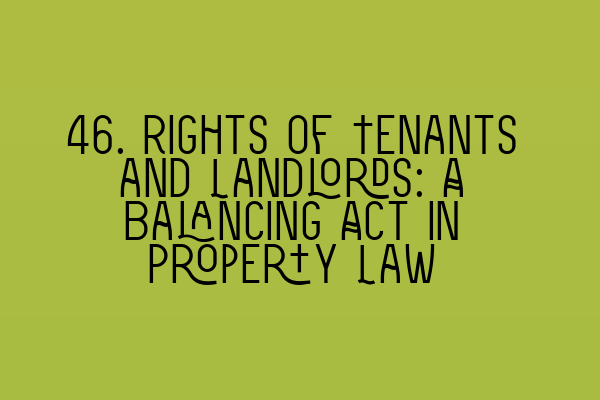Welcome to the blog of SQE Property Law & Land Law! In today’s post, we will explore the rights of tenants and landlords in property law, and how striking a balance between these rights is crucial. Whether you are a tenant looking for guidance or a landlord seeking legal insights, we have got you covered.
Understanding the Rights of Tenants
Tenants have the right to enjoy a safe and habitable living space, free from any health or safety hazards. This means that landlords are responsible for ensuring that the property is in good condition and meets all the necessary requirements.
Additionally, tenants have the right to privacy. Landlords cannot enter the rental unit without proper notice, except in cases of emergencies. It is essential for both landlords and tenants to be aware of these rights to maintain a healthy and respectful relationship.
The Rights and Responsibilities of Landlords
Landlords also have important rights and responsibilities in property law. They have the right to receive rent payments on time and to be reimbursed for any damages caused by tenants beyond normal wear and tear.
Landlords must also provide their tenants with proper notice before making any changes that may affect their living arrangement, such as raising the rent or terminating the tenancy. Understanding these rights and responsibilities is vital for landlords to protect their interests while maintaining a fair and ethical approach to property management.
Striking a Balance: The Role of Property Law
Property law plays a crucial role in balancing the rights of both tenants and landlords. It provides a legal framework that outlines the rights, responsibilities, and obligations of each party, ensuring fairness and equity in every property transaction.
For tenants, property law offers protection against unfair eviction, discrimination, and housing violations. It also establishes guidelines for rent control and regulations for security deposits.
For landlords, property law provides the means to enforce lease agreements, collect rent, and take legal action against non-compliant tenants. It offers safeguards against property damage and provides avenues for dispute resolution.
By upholding the principles of property law, tenants and landlords can navigate their rights and responsibilities with confidence, fostering a harmonious and productive rental relationship.
Seeking Legal Expertise
When dealing with property law matters, it is important to seek the guidance of a qualified solicitor who specializes in property law and land law. At SQE Property Law & Land Law, our team of legal experts can provide you with the advice and assistance you need.
Whether you require assistance with lease agreements, eviction processes, or property disputes, our experienced solicitors can guide you through the complexities of property law. We understand the importance of protecting your rights while maintaining a fair and professional approach.
Conclusion
The rights of tenants and landlords in property law form an intricate balancing act. Understanding these rights and responsibilities is crucial for all parties involved in property transactions. By seeking legal expertise and upholding the principles set by property law, we can ensure a fair and harmonious rental relationship.
For additional resources and information about SQE preparation courses and SRA SQE exam dates, please check out the following links:
